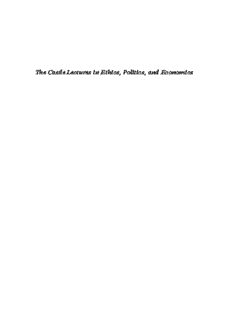
Hollywood Westerns and American Myth: The Importance of Howard Hawks and John Ford for Political Philosophy PDF
Preview Hollywood Westerns and American Myth: The Importance of Howard Hawks and John Ford for Political Philosophy
The Castle Lectures in Ethics, Politics, and Economics This page intentionally left blank ROBERT B. PIPPIN Hollywood Westerns and American Myth The Importance of Howard Hawks and John Ford for Po litic al Philosophy NEW HAVEN AND LONDON Published with assistance from the foundation established in memory of Calvin Chapin of the Class of 1788, Yale College. Copyright © 2010 by Yale University. All rights reserved. This book may not be reproduced, in w hole or in part, including illustrations, in any form (beyond that copying permitted by Sections 107 and 108 of the U.S. Copyright Law and except by reviewers for the public press), without written permission from the publishers. Set in New Aster type by Westchester Book Co. Printed in the United States of America. Library of Congress Cataloging-i n- Publication Data Pippin, Robert B., 1948– Hollywood westerns and American myth : the importance of Howard Hawks and John Ford for pol itic al philosophy / Robert B. Pippin. p. cm. — (Castle lectures in ethics, politics, and economics) Includes bibliographical references and index. ISBN 978- 0- 300- 14577–9 (cloth : alk. paper) 1. Western fi lms— History and criticism. 2. National characteristics, American, in motion pictures. 3. Politics in motion pictures. 4. Hawks, Howard, 1896– 1977—Criticism and interpretation. 5. Ford, John, 1894–1 973—Criticism and interpretation. I. Title. PN1995.9.W4P53 2010 791.43'6278—dc22 2009031174 A cata logue record for this book is available from the British Library. This paper meets the requirements of ANSI/NISO Z39.48–1 992 (Permanence of Paper). 10 9 8 7 6 5 4 3 2 1 THE CASTLE LECTURES Parts of this book were given as the Castle Lectures in Yale’s Program in Ethics, Politics, and Economics, delivered by Rob- ert Pippin at Yale University in 2008. The Castle Lectures w ere endowed by Mr. John K. Castle. They honor his ancestor the Reverend James Pierpont, one of Yale’s original founde rs. Given by established public fi gures, Castle Lectures are intended to promote refl ection on the moral foundations of society and government and to enhance under- standing of ethical issues facing individuals in our complex modern society. v For Michael Fried and Jim Conant CONTENTS Ac know ledgm ents ix 1. Introduction 1 2. Red River and the Right to Rule 26 3. Who Cares Who Shot Liberty Valance? The Heroic and the Prosaic in The Man Who Shot Liberty Valance 61 4. Politics and Self-K nowledge in The Searchers 102 5. Conclusion 141 Notes 157 Bibliography 179 Index 189 Color plates follow page 134 vii This page intentionally left blank AC KNOW LEDG MENTS I AM very grateful to Yale University, to the Program in Ethics, Politics, and Economics there, and to Seyla Benhabib for the invitation to give the Castle Lectures in 2008 (and for the pro- gram’s willingness to permit me such an unusual approach to issues in pol itic al philosophy), and I am grateful for discussions about the topics with faculty and students at Yale. I have dis- cussed the issues in the book with a number of individuals and audiences over the past year and a half and profi ted a great deal from these discussions at the Einstein Forum in Berlin, Catho- lic University, the University of Binghamton, Miami University of Ohio, the California College of the Arts, Indiana University, Georgetown University, the University of North Carolina, Sarah Lawrence College, and the Wissenschaftskolleg zu Berlin. I am especially grateful as well to Bob von Hallberg for encouraging me to give the series at Chicago (which I did in May 2008) and for supporting such a series, and to Greg Freeman and Jonny Thakkar for their help in the org a ni za tion and publicity for those ix x AC KNOW LEDG MENTS lectures. I am very much indebted to the long, spirited discus- sions with colleagues and students that followed each of the lectures. All of the work on this book was made possible by the Andrew W. Mellon Foundation, and I am happy to have yet an- other occasion to thank the foundation for its extraordinary generosity and its Distinguished Achievement Award. I owe a great deal as well to a number of people with whom I have dis- cussed the issues in this book, all of whom made important and useful suggestions. I am especially grateful to Brendan Boyle, David Bromwich, John Carroll, Jim Conant, Raine Daston, Bo Earle, Michael Fried, Paul Friedrich, Bob Gooding- Williams, Tom Gunning, Miriam Hansen, Mark Jenkins, Dan Morgan, Glenn Most, Richard Neer, Thomas Pavel, Gil Perez, Victor Per- kins, C. D. C. Reeve, Susan Wolf, Candace Vogler, Bob von Hall- berg, and George Wilson. The book is dedicated to two of these interlocutors, my friends Michael Fried and Jim Conant. I can- not possibly describe the degree of indebtedness I feel to both for many years of conversation about the issues treated h ere and about many other related ideas, except to say that I could not have possibly written this book without their help and friendship. I owe a special debt to my former colleague Mark Wilson, who some thirty years ago disabused me of my Euro- phile prejudices about “art” fi lms and introduced me to the wonders and depths of classic Hollywood cinema.
Description: